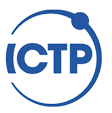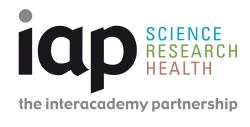The Intergovernmental Panel on Climate Change (IPCC) is in the process of preparing its Seventh Assessment report (AR7). The IPCC Working Groups are seeking highly motivated early-career researchers from developing countries and countries in transition to apply as Chapter Scientists to support author teams for the AR7.
The call for applications is being coordinated by ICTP's External Activities Unit, together with the InterAcademy Partnership (IAP), organisations with extensive track records for supporting sustainable science in the global South.
This is a great opportunity for early-career researchers to get involved with the IPCC process.
Applicants may apply to only one Working Group and to a maximum of three Chapters. Successful applicants will be required to work under the general rules and procedures of the IPCC. Chapter Scientists will be acknowledged in the IPCC report.
Chapter Scientists will not be employees of IPCC, or IPCC Working Groups’ Technical Support Units and will be expected to work from their home institutions (if applicable) or be based in a country where they have legal standing to work independently.
Contractual arrangements for the Chapter Scientists role, which includes a stipend over the course of 4 years, as well as equipment and IT support, will be managed by ICTP. They will also receive support for travel and subsistence for their participation in Lead Author Meetings, which occur twice per year.
Successful applicants will need to demonstrate that they can commit for a minimum of 48 months from November 2025.
Roles & Responsibilities of a Chapter Scientist
The primary role of a Chapter Scientist is to assist the author team of a chapter in the Report. Chapter Scientists are accountable to the Coordinating Lead Authors (CLAs) of the chapters which they serve, and will have to also report their progress regularly to ICTP/IAP. The IPCC’s Working Group Technical Support Units (TSUs) coordinate the activities of Chapter Scientists across the report. An indicative list of possible tasks includes:
(a) Directly supporting the CLA in
- Assisting online meetings and at Lead Author Meetings, e.g. note taking, coordinating correspondence between authors, and coordinating online meeting times.
- Keeping records of review comment responses up to date and accurate.
- Assisting in reviewing relevant literature, including Indigenous Knowledge and Local Knowledge.
(b) Supporting the report compilation process
- Assisting authors team in compiling, revising and organising chapter contributions and technical editing.
- Identification and compilation of references and maintaining a complete set of references.
- Managing content on the Author Portal.
- Assist with quality control in relation to the style guide, chapter formatting and glossary.
(c) Be related to content of chapters
- Assisting in the design and development of figures, tables and their content and where applicable, provision of technical support for data management and archive.
- Assisting with tracing assessments to underlying literature.
- Monitoring overlaps or inconsistencies across chapter.
- Assist in cross-referencing to other chapters/Cross Chapter Boxes, literature search and management of references.
Application requirements
The main selection criteria are:
- Applicants must be a citizen of a developing country or economies in transition (countries listed in Annexes 2 and 3 of the IPCC Country Categories) at the time of application.
- Applicants must have an advanced university degree related to climate change, its scientific bases, impacts, vulnerability and response options (adaptation and/or mitigation).
- Applicants must be fluent in English writing and reading at a scientific level.
- Evidence of publication in international journals, participation in scientific activities at the national and/or international levels and/or policy engagement will be considered an advantage.
- Experience in data analysis and visualization using Python or R, Proficiency in statistical analysis, coding, workflow automation, and version control (Git/GitHub) will be considered an advantage.
- Familiarity with GIS tools, Big Data platforms, and document integration tools will be considered an advantage.
- A working knowledge of additional languages will be considered an advantage.
- Applications from women scientists and citizens of Least Developed Countries (LDCs) and Small Island Developing States (SIDS) are particularly encouraged.
This opportunity is provided strictly for early career scientists; applications from established scientists will not be considered.
- Applicants must be a citizen of a developing country or economies in transition (countries listed in Annexes 2 and 3 of the IPCC Country Categories) at the time of application.
- Applicants must have an advanced university degree related to climate change, its scientific bases, impacts, vulnerability and response options (adaptation and/or mitigation).
Contractual arrangements for the Chapter Scientists role, which includes a stipend over the course of 4 years, as well as equipment and IT support, will be managed by ICTP. They will also receive support for travel and subsistence for their participation in Lead Author Meetings, which occur twice per year.
Apply online at https://e-applications.ictp.it/applicant/login/4175
For any further questions, contact oea@ictp.it.



















